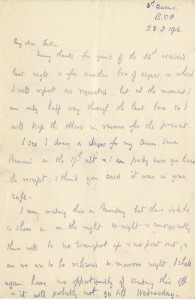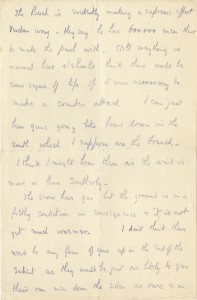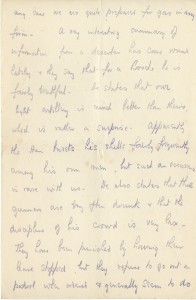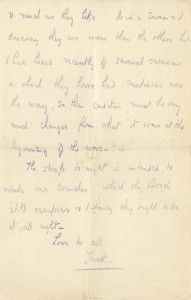Transcription
8th Queens
B. E. F.
28. 2. 1916.
My dear Father
Many thanks for yours of the 25th received last night & for another box of cigars, on which I will report as requested, but at the moment I am only half way through the last box. so I will keep the others in reserve for the present.
I see I drew a cheque for my Comm. Union Premium on the 17th ult & I am pretty sure you have the receipt; I think you said it was in your safe.
I am writing this on Monday, but there is to be a show on on the right to-night & consequently there will be no transport up & no post out, & as we are to be relieved to-morrow night, I shall again have no opportunity of sending this off & it will probably not go till Wednesday.
The Bosch is evidently making a supreme effort Verdun way – they say he has 600, 000 men there to make the push with. Still everything is normal here, & I should think there would be some signs of life if it was necessary to make a counter attack. I can just hear guns going like beams down in the south, which I suppose are the French – I think I might hear them as the wind is more or less southerly.
The snow has gone, but the ground is in a filthy condition in consequence & it is not yet much warmer. I don’t think there need to be any fear of gas up in the end of the salient, as they would be just as likely to gas their own men down the sides as ours & in any case we are quite prepared for gas in any form. A very interesting summary of information from a deserter has come round lately & they say that for a Bosche, he is fairly truthful. He states that our light artillery is much better than theirs, which is rather a surprise. Apparently the Hun bursts his shells fairly frequently among his own men, but such an occurrence is rare with us. he also states that the gunners are very often drunk & that the discipline of his crowd is very lax. They have been punished by having their leave stopped but they refuse to go out on patrol when ordered & generally seem to do v. much as they like. He is a Saxon & I daresay they are worse than the others, but I had heard recently of several occasions on which they have had mutinies over the way, so their condition must be very much changed from what it was at the beginning of the war.
The strafe to-night is intended to retake our trenches which the Bosch still occupies & I fancy they ought to do it all right.
Love to all
Jack.
Commentary





My grandfather Fred Heasman was a CSM in B Company, 8th Service Battalion RWS and was wounded on 27 September 1915 somewhere south of Hulluch village. Fred Heasman had already served 12 years in the army prior to the war having enlisted in 1901, fibbing about his age. On discharge in 1913 he had the rank of Corporal and was a signals instructor. Fred had served overseas in South Africa, on the North West Frontier and in the Punjab. When he joined the army in 1901 he had little education having left school at the age of ten, and was almost illiterate. He credited the army for the education he received throughout his career until his final discharge 1921.
Fred re-enlisted in September 1914 and was promoted CSM in April 1915 and trained the new volunteer troops of the 8th Battalion. His time at the front was short . It was a day of great slaughter as Jack Piers recounts. Fred survived on turnips and beats and had experienced hand to hand combat with a wounded German soldier before being picked up by his comrades. The rest of his war was spent in ‘hospital blues ‘. Fred tended the wound twice daily for the rest of his life.
In 1919 he was commissioned a second lieutenant but soon after resigned his commission and transferred to the Essex Regiment as a CSM at Warley Barracks near where my Grandmother lived. They had spent little time together since their wedding in 1913. Fred Heasman completed his service in 1921. He died on the anniversary of the wounding on 27th September 1971, aged 87.
Our family custom back in the fifties was to spend boxing day with my Grandparents and an important Christmas ritual was when grandad would raise a glass ‘to absent friends’ and we held a minutes silence. The silence was for the men lost at Loos but also for the fathers of his two granddaughters, one on a hospital ship torpedoed off Tobruk in 1941, the other in the Korean War. On a lighter note, another ritual was a ‘vamping session’ on the mouth organ which I now see might be a result of Jack Piers’ policy of keeping soldiers busy.
There are so many fascinating details recorded by H.J.C ‘Jack’ Piers. His perceptive observations, humour and the the small requests he makes are fascinating reading. The contextualising commentaries too are informative Jack Piers was obviously a very able man. There is a chasm between the lives of officers and the men. Jack’s orders with Harrods and Fortnum and Masons would appear comic today but for the fact he was an exceptional officer committed to the wellbeing of men under his command